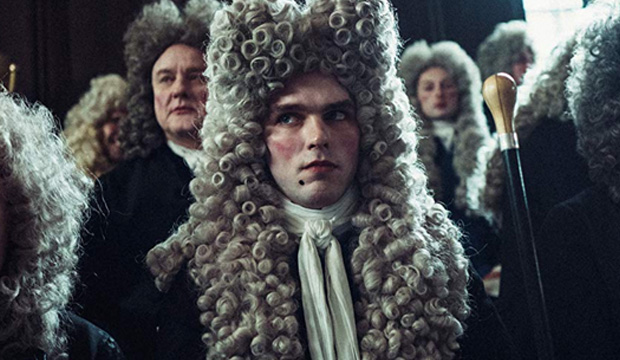
You’ll recognise blue-eyed British babe Nicholas Hoult as the kid from About A Boy and as Tony from Skins but since his breakout roles, he’s gone on to work on some acclaimed cinema including award-winning 2018 flick The Favourite.
[jwplayer 5B6taT8h]
In the period comedy-drama, Hoult plays Robert Harley, 1st Earl of Oxford and Earl Mortimer, a real-life British statesman of the late Stuart and early Georgian periods.
Speaking to Pedestrian.TV about the acclaimed flick, Nicholas described the script as one of “the best things [he’d] ever read.” No big deal, just literally the best thing he’s ever bloody read.

Hoult’s get-up in The Favourite
Hoult stars alongside legends including Olivia Colman, Emma Stone, Rachel Weisz and Taylor Swift‘s BF Joe Alwyn.
Here, we probe old m8 Nico about the groundbreaking film which has scored 119 awards and 276 nominations.
What did you make of the script?
It was one of the best things I’d ever read because it painted its world so well. You knew what you were stepping into. I could feel it within Yorgos’ mind, but what was interesting was it was the first time he was dealing with a real story. A period story. He’s created these strange, weird worlds of his own beforehand. So it was a departure to a degree, but it definitely still felt within his universe.
Usually, with period drama, the writing can be quite dry and boring. That wasn’t the case with this script, and how Tony [McNamara] had adapted it. It was very funny, sharp, dry, and moving.
The movie is focused on this love and power triangle between these three women, and the male characters are kind of orbiting it. [Joe Alwyn’s character] Masham gets used in a romantic sense for gain for Emma’s character, and then my character is trying to forge his own political gains, but needs to try and navigate their connections to gain a foothold to get his voice heard. It’s very much about grabbing who you can and trying to gain some sort of foothold.
Considering how well it fits Yorgos’s sensibilities, it’s also surprisingly accurate, historically.
There were moments, I think, that Yorgos took an almost twisted pleasure out of staging. So you’d bow to the Queen in a grand fashion, and then the rule was you weren’t allowed to turn your back on her as you left the room.
So we’d be in a room that was 40, 50 feet long, and there would be 30 of us, bowing to the Queen and shuffling out awkwardly and backwards. A lot of times when you get on a film set, that’s the kind of detail you would cut away from; even if it was historically correct it would be too silly. But Yorgos leans right into it and embraces it.
Yorgos seems particularly interested in awkwardness and embarrassment. Is it challenging to lean into that?
I think it was helped by the rehearsal period that Yorgos set up. We had two weeks of rehearsal with the entire cast in the room. It wasn’t about sitting around talking about the period, the characters, the scenes, with highlighter pens out.
It was about being silly in front of each other. There were a lot of strange, weird exercises and scene readings that made everyone feel comfortable with looking stupid in front of each other. That bond, in a sense, was built in those two weeks.
So when you get to set, you can jump in and be foolish.
How did you see your character, Harley?
He’s Machiavellian, dry, funny, and very twisted. I thought it would be so much fun to play him. But to be honest, I wasn’t too aware of the era, and in the version of the script that I read there were few character descriptions. I went in and read with Yorgos for the audition, and then ended up at the readthrough a week later and met Nadia Stacey, who was the hair and make-up designer. She was like, “Has anyone spoken to you about your look for the movie?” I said, “No… Should they have?” And she goes, “Right, OK… I guess I’ll show you what we’re thinking.”
It was a bit of a whirlwind, then, being thrown into this world with Sandy Powell, the costume designer, who put me in three-inch heels, and then the huge wigs and all this wonderful costume and make-up. It became more and more eccentric and more and more bizarre as we went on, and the personality was built up. He was meant to be a very snappy dresser for the time. It really all came together through that.
There was never really a moment of sitting down with Yorgos. I think at one point in the audition I’d said, “What kind of thing do you imagine for this character?” He just said, “We’ll find out.” I think that was the only time we ever really spoke about him.

How would you describe your working relationship with Yorgos?
Well, he’s not as mad as maybe his films would lead you to suspect [laughs]. He’s not mad at all. He’s quite quiet, in fact. The wonderful thing is, if you hear nothing from Yorgos, you know you’ve done well. He’s not one of those directors that will come to you with endless praise. If he moves on, you know he got what he needed.
I remember one moment where he came up and said, “What kind of movie do you think this is?” We went, “We’re not entirely sure; we’re still trying to work it out to be honest with you.” He kind of thrives on that playfulness. You feel like it shouldn’t work; if most directors put actors in that position, you’d feel quite vulnerable and maybe it’d make you seize up. But it has the opposite effect with Yorgos, and he somehow manages to create an atmosphere where the playfulness and freedom that he gives you is precisely what makes the film what it is, and somehow you’re able to perform it just as he wants it to be.
And you let go, because it just wouldn’t work if you tried to fight it. There’s no room for ego within the dynamic of this, which is lovely. It’s liberating, really, to put your full faith in him and just go the way that feels right. You can get quite caught up in overthinking things, so this approach is quite clean in that sense.
How do you think the film will play with audiences?
What I love is how many moments there are that will really split the audience. Moments where some will laugh, and others will whimper at the same time. It’s what’s so brilliant about the film; it works either way. Even watching the film myself, knowing where it’s going, I think “Oh that’s funny, but it’s also really tragic.” It’s a great contradiction.
Multi-Award winning film, The Favourite is available on Blu-ray, DVD & Digital now.



